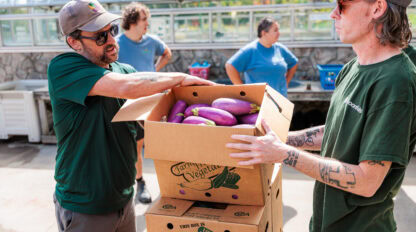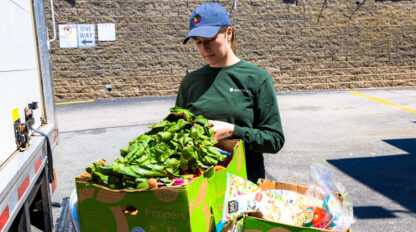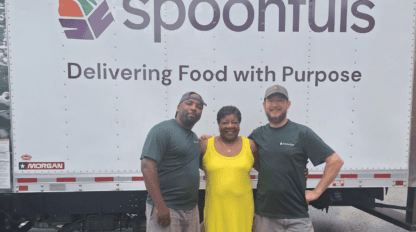Spoonfuls Spotlight: United Way of Greater New Bedford

This September, Spoonfuls expanded our food recovery work to Southeastern Massachusetts — a key step in our Strategic Plan and a direct response to rising rates of food insecurity across the state. The partnership launched at a critical moment. Soon after Spoonfuls began distributing food in areas like Brockton, Bridgewater, Fall River, Taunton, and New Bedford, the federal government shut down, and as of this blog’s publication, no portion of November SNAP benefits has been distributed.
We recently connected with Michelle Neves Hantman, President & CEO of United Way of Greater New Bedford (UWGNB), one of our key partners in the region, to talk about our growing collaboration and shared goals in Southeastern Massachusetts.
Tell us about UNWGNB and the Hunger Commission. What kind of food programming is happening through the United Way?
United Way of Greater New Bedford’s Hunger Commission has been addressing food insecurity in our community since 1995 and is recognized region-wide as a leader in hunger relief. The Hunger Commission delivers donated and recovered food on a regular basis to a network of nearly 30 local partners, including food pantries, soup kitchens, shelters, and Council on Aging centers, providing both non-perishable items and fresh, healthy options such as produce, protein, and dairy.
In addition to regular distributions, the Hunger Commission hosts Mobile Markets and two large-scale events each year, around Thanksgiving and before spring school vacation, where we engage volunteers to help package food. We also source additional food through drives at local businesses, ensuring that the community has reliable access to food while fostering meaningful community engagement. This programming allows the Hunger Commission to continue developing innovative solutions to the region’s food insecurity challenges.
You’re one of Spoonfuls’ first partners in Southeast Massachusetts! What are you most excited for as we go about this work together?
We’re excited to see how this partnership will expand the impact of food recovery in our region. Spoonfuls brings a wealth of experience and strong connections in food sourcing, while we contribute deep local relationships and a well-established distribution network of nearly 30 pantries, soup kitchens, shelters, and other programs. By combining these strengths, we’ll be able to move more food, reach more people, and make the system work more efficiently for families who rely on it.
What makes Spoonfuls different from other organizations you partner with? How has, or how will, our partnership affect your program, especially in light of recent federal funding cuts and other attacks on safety net programs?
Spoonfuls is a completely different kind of partner for us. While we do similar work in different regions, coming together to leverage our efforts collaboratively is a game-changer. Spoonfuls brings broader outreach and strong relationships with regional and national vendors, along with a model that emphasizes efficiency, sustainability, and relationship-building on a larger scale. This complements our hyperlocal approach and deep community ties. Together, we can increase the amount of food distributed, strengthen our collective impact, and respond more effectively to rising needs and growing gaps in the safety net.
Even as we’re expecting SNAP recipients to eventually receive a portion of their November benefits, there’s still a lot of uncertainty about what they’ll actually receive. How has this been impacting the Greater New Bedford community over the past week? What have you been seeing? How are you responding?
Even with the expectation that some SNAP benefits may eventually be released, the uncertainty itself has already created significant strain on families in Greater New Bedford. Over the past week, we’ve seen a noticeable increase in calls and walk-ins at our Family Resource Center. Food pantries are reporting higher demand, and they are preparing for that demand to grow in the coming days.
At United Way of Greater New Bedford, we’ve been responding on several fronts by coordinating with state and local partners, relaunching our Help United Fund to support food pantries with flexible dollars, and expanding food recovery efforts through the Hunger Commission. Our new partnership with Spoonfuls has been key, and our collaboration could not have begun at a better time.
We’re also sharing up-to-date resource information with families and employers to ensure people know where to turn for immediate help. Our focus right now is on getting accurate information and resources out to the community as quickly as possible, while continuing to advocate for a timely resolution of the SNAP freeze.
What’s a myth you’d like to bust about hunger – either generally, in your region, or otherwise?
One myth we’d like to bust about hunger is that it only affects people who are unemployed or living in extreme poverty. In reality, food insecurity touches a wide range of households in our region, including working families, seniors on fixed incomes, and students. Many people who are employed full-time still struggle to put enough food on the table, especially when faced with rising costs for housing, utilities, and healthcare. Hunger is not a distant problem. It is happening in our neighborhoods, and addressing it requires community-wide solutions.


